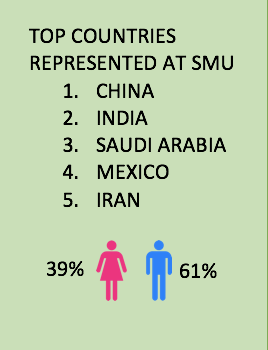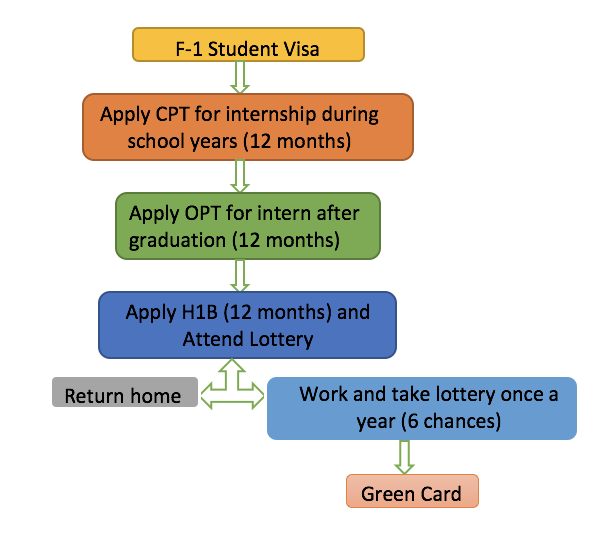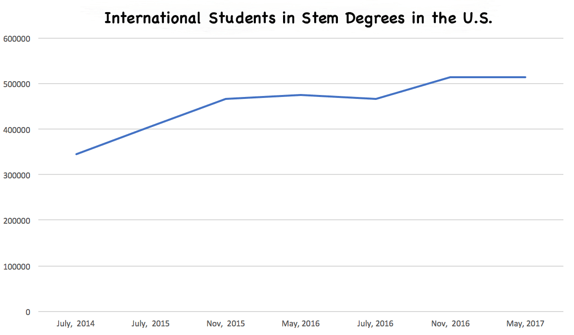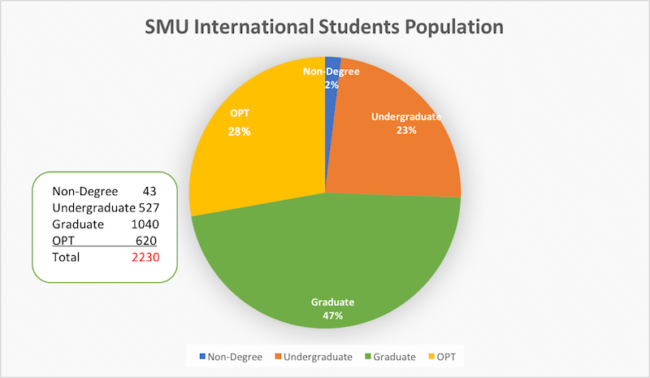Haifa Alhumaid, a senior from Saudi Arabia, plans to enroll in SMU’s accounting program after getting her undergraduate degree in May. After that, she plans to return to her home country.
“After I finish my study, I want to go back to Saudi because that was actually my first goal: to get an education here and then go back,” Alhumaid said.
Snehal Sreekumar, a graduate student in telecommunications and networking engineering from India, will graduate in December. Unlike Alhumaid, he does not want to go back to his home country, but would prefer to work and live in the U.S. He has applied for numerous jobs.
“You need to go for big companies,” Sreekumar said.
These are the voices of typical of U.S. and SMU international students, who must often make difficult decisions about staying here after they complete their education or returning home.
“It is a tough decision because we have been here for so long, but we also have family back in our country,” said Xin Xu, the president of International Student Organization from China.
However, students like Sreekumar who decide to stay in the U.S., often have a hard time finding jobs because of the complicated visa process.
“I attended the engineering career fair, and 90 or 95 percent of them require work authorization,” Sreekumar said.
Students must receive an F-1 student visa to study in the U.S. They fill out lengthy applications for internships if the degree requires one. After graduating, they must file another application to stay in the U.S. for a one-year internship. To get an official job, they must fill out more documents and attend a lottery to receive an official work visa known as an H-1B.
The employer needs to file applications and fees from $1,600-$7,400 plus the attorney fee for the employee. Then the employee must attend a lottery April 1 for the H-1B visa. If the employee does not win the H1B visa lottery, he or she must return home, and the employer will not get a refund.
“It’s harder for international students to get a job than Americans I think, this is because employers don’t want to go through the process,” said Emanuel Eriksson, an SMU International Student Scholar and Service (ISSS) officer from Switzerland.
The number of international students in the U.S. and at SMU is increasing. There are 2,230 undergraduate and graduate international students at SMU this year, up by 8.4 percent over last year. Across the country, the number reached 1.18 million in May, an increase of 2 percent over last year.

http://www.smu.edu/-/media/Site/international/isss/about/Fall2017Population.ashx
International students study in the U.S. hold F-1 visas during school years.
International students with F-1 visas are also required to apply for Optional Practical Training (OPT) related to their major area of study if they want a job offer in the U.S. after completing a degree. Those who need to work off-campus during their school years are required to apply for Curricular Practical Training (CPT).
Students can work up to 12 months of OPT and CPT employment authorization. Students in certain science, technology, engineering and mathematics (STEM) fields can receive up to 24 months of OPT employment authorization.

Many students choose STEM majors because it is easier to find an internship or job in the U.S. and they get an extended OPT time. Forty-three percent of international students in the nation enroll in STEM programs. That number has increased eight percent since May 2016.

“We do see that many of our graduate students from Lyle tend to stay, at least while they are on their OPT,” ISSS officer Claudia Sotomayor said. “We have a big number of them that are working under OPT, so we obviously have a great desire for them to at least to get the practical experience for a year.”
The trend of students taking an internship or a job in the U.S. has become more popular. The number of international students on OPT increased 160 percent from 2007 to 2016. SMU has 620 international students who get OPT authorization in 2017.

http://www.smu.edu/-/media/Site/international/isss/about/Fall2017Population.ashx
“Besides the wonderful degrees, I think the fact that they are here in Dallas where they are very close to a lot of the headquarters and companies that hire international students, and that’s the biggest thing they have in front of them,” Sotomayor said.
Students who want to work in America after using their OPT often face trouble staying in the U.S. since the process of getting an H1B working visa is complicated and risky.
Currently, the H-1B visa for temporary workers has a limit of 65,000 visas each fiscal year, with an additional 20,000 positions for workers with a master’s degree or higher from a U.S. university.
“We see a lot of our students moving from OPT to the H-1B visa type if the employer wants to sponsor them for their H1B,” Sotomayor said.
Those lucky enough to get an H-1B visa in the lottery require attending the lottery every year. They have six chances per year to maintain their status. They want to stay in the position before making decisions.
Yifeng Wang is an SMU alumni from China who has worked for Ursus Holdings in Dallas as a data analyst for a year. He married Xueer Yin, whom he met at SMU. He wants to stay in the U.S. for at least five years before deciding to apply for a green card or to return home.
“If we really like here after five years, we may want to stay here,” Wang said.
The green card allows immigrants to live and work in the U.S. permanently.
Alhumaid will have it a little easier since she will return to Saudi Arabia and will not have to apply for a work visa.
Saudi Arabia encourages students to study abroad, and the government sends thank-you letters to them every year. Students are more willing to go back to work for the country since they feel important to its nation-building.
“The Saudis want the students, want the people to get an education, so they make sure we study abroad and we go back and we benefit the country,” Alhumaid said.
Many students go back to their countries for jobs because they want to build careers near family and friends.
“Part of my applied physiology and health management degree includes an internship. I am trying to get experience in America because I think it will benefit my future employment opportunities in New Zealand,” senior Anneke Grogan said.








